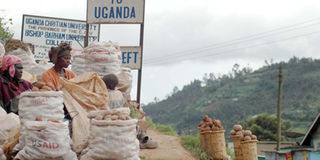New hope for Kigezi potato farmers

What you need to know:
With so many potatoes lost in post-harvest management, coupled with bad prices because middle-men take a huge chunk of profits, a processing plant in Kigezi region is the most exciting news farmers here can get. The potato plant machines will sort, clean and chip the potatoes before storing them at a safe temperature for a long time keeping a steady supply of potatoes throughout the year.
Samuel Kasina grows Irish potatoes on his four acres in Kisoro District but has to transport them for over 500km to Kampala where he has an assured market. The expenses he incurs on transportation and middlemen, before his potatoes can reach the consumer’s plate, are unbearable and they reduce his profit margin by almost 70 per cent.
But Kasina will no longer have to worry over transport and middlemen expenses as his produce will be bought from him directly while still in Kigezi, at a price he will participate in setting. All this, thanks to a local investor, Mr Tom Mugenga, who has decided to set up a potato processing factory in Kigezi.
Kisoro Potato Processing plant will save hundreds of farmers like Kasina the burden of looking for market for the abundant potatoes in Kigezi region that produces 80 per cent of the total Irish potatoes farmed in the country.
The processing plant recently commissioned by President Museveni, has blessings of National Agricultural Research Organisation (Naro) and the National Agricultural Advisory Services (Naads) and will serve farmers in the western districts of Kabale, Kisoro, Bushenyi, Rukungiri, Ntungamo, Mbarara and several districts in DR Congo and Rwanda.
According to the plant manager, Dr John Bahana, the decision to set up the factory in Kisoro came after a study was done in Europe.
“The weather in Kigezi is conducive for potato growing where diseases and pests are suppressed. [But] the farmer is always cheated by the middle-man who goes looking for markets in Kampala. At our factory, we shall be dealing with the farmer directly to ensure that he gets value for money,” Dr Bahana added.
In Uganda, Irish potato is commonly used for making French fries or chips, with a plate at a high scale restaurant going for Shs10,000. However, a sack of raw potatoes goes for between Shs50,000 and Shs100,000 in the city markets.
“When Nando’s had just started, they used to import their potatoes from South Africa and Egypt, reason being the locally produced did not meet the demanded standard. What we are going to do is supply high quality seeds to the farmers and, working with the Ministry of Agriculture, we shall be able to also supply insecticides,” Dr Bahana added.
The proprietor, Mr Mugenga, encourages farmers to embrace the opportunity and grow more potatoes.
“Our cold rooms are on their way to Kisoro and as we have already shown some of the farmers – in terms of capacity – we can buy as much potato as possible. All they need to know is we shall buy everything they will produce at a negotiable price,” headed.
More opportunities coming
And it seems that marketing is also growing broader, with Kentucky Fried Chicken, the world’s largest chain of fried chicken fast food restaurants, headquartered in the United States, coming to town. “Kentucky will need constant suppliers and we should ask the government to protect us from Egyptian and South African farmers supplying potatoes to our country,” Mr Mugenga says. An “American icon”, KFC is the second largest restaurant chain after McDonald’s, with over 17,000 outlets in 105 countries and territories.
Potato farmers in Kigezi, through groups like Muko Expanded Potato Producers’ and Kamuganguzi Potato Growers’ Associations supply to Nando’s and reports at Kamuganguzi show that group members earned as much as Shs300m last year from this single consumer.
Another grouping that has helped to bring together farmers to earn big money is Kisoro Potato Growers Association. And Mr Mugenga says they have signed a Memorandum of Understanding with the farmers to have their produce bought and processed by Kisoro Potato Processing Plant.
“We shall be paying these farmers instantly while those who want to open an account can do so at our new branch of Crane Bank in Kisoro and have their money saved there,” Mr Mugenga added.
In the past farmers have been frustrated by price fluctuations whereby their produce lacks market or buyers refuse to take the poorly kept potatoes.
“Some of us cannot afford to store the potatoes, especially when it is a bumper harvest. In the end, they rot and we throw them away,” another farmer Jane Karungi said.
But Dr Bahana says their fabricated cold rooms will be able to keep the potatoes fresh until they reach the market.
“We have machines that will sort, clean and chip the potatoes before we store them at a safe temperature for a long time,” Dr Bahana added.
Dr Bahana and Mr Mugenga are appreciative of the Dutch government that has offered both technical and other forms of support to ensure that the facility, that is likely to change the lives of Kigezi farmers, is coming into reality.
“Not all governments can help you when it comes to venturing into fresh projects. But what everyone should know is that we shall be dealing with over 10,000 farmers. We shall also supply the by-products to other users as manure and the soil fertility will be preserved,” Mr Mugenga said. As Mr Kasina walks to his garden to prepare it for another planting season, he is full of energy. “It’s good my potatoes will no longer rot. I will hire more people to plant for me more potatoes so that I can make use of the processing plant.”




